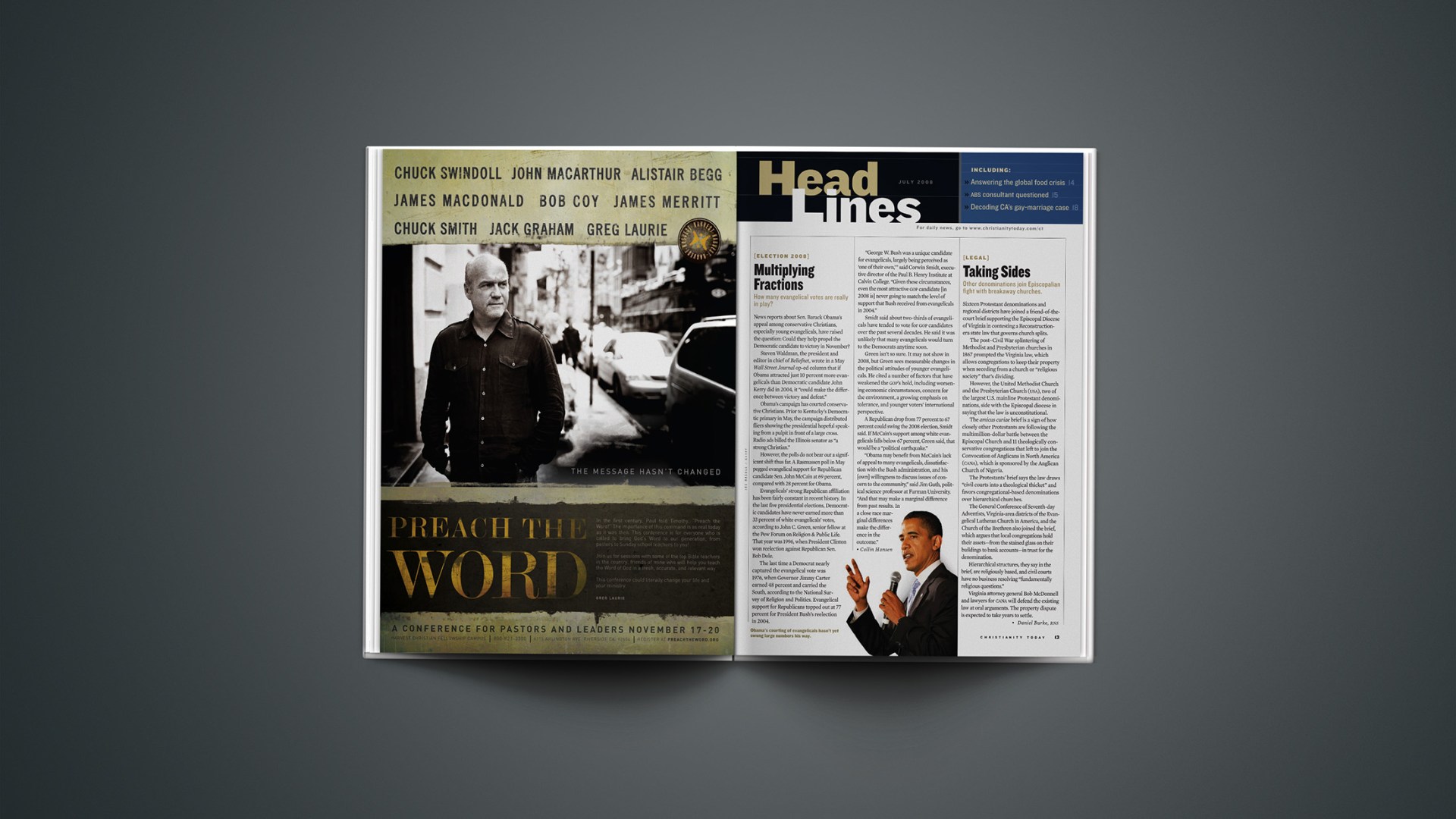News reports about Sen. Barack Obama’s appeal among conservative Christians, especially young evangelicals, have raised the question: Could they help propel the Democratic candidate to victory in November?
Steven Waldman, the president and editor in chief of Beliefnet, wrote in a May Wall Street Journal op-ed column that if Obama attracted just 10 percent more evangelicals than Democratic candidate John Kerry did in 2004, it “could make the difference between victory and defeat.”
Obama’s campaign has courted conservative Christians. Prior to Kentucky’s Democratic primary in May, the campaign distributed fliers showing the presidential hopeful speaking from a pulpit in front of a large cross. Radio ads billed the Illinois senator as “a strong Christian.”
However, the polls do not bear out a significant shift thus far. A Rasmussen poll in May pegged evangelical support for Republican candidate Sen. John McCain at 69 percent, compared with 28 percent for Obama. Evangelicals’ strong Republican affiliation has been fairly constant in recent history. In the last five presidential elections, Democratic candidates have never earned more than 33 percent of white evangelicals’ votes, according to John C. Green, senior fellow at the Pew Forum on Religion & Public Life. That year was 1996, when President Clinton won reelection against Republican Sen. Bob Dole.
The last time a Democrat nearly captured the evangelical vote was 1976, when Governor Jimmy Carter earned 48 percent and carried the South, according to the National Survey of Religion and Politics. Evangelical support for Republicans topped out at 77 percent for President Bush’s reelection in 2004.
“George W. Bush was a unique candidate for evangelicals, largely being perceived as ‘one of their own,'” said Corwin Smidt, executive director of the Paul B. Henry Institute at Calvin College. “Given these circumstances, even the most attractive GOP candidate [in 2008 is] never going to match the level of support that Bush received from evangelicals in 2004.”
Smidt said about two-thirds of evangelicals have tended to vote for GOP candidates over the past several decades. He said it was unlikely that many evangelicals would turn to the Democrats anytime soon.
Green isn’t so sure. It may not show in 2008, but Green sees measurable changes in the political attitudes of younger evangelicals. He cited a number of factors that have weakened the GOP’s hold, including worsening economic circumstances, concern for the environment, a growing emphasis on tolerance, and younger voters’ international perspective.
A Republican drop from 77 percent to 67 percent could swing the 2008 election, Smidt said. If McCain’s support among white evangelicals falls below 67 percent, Green said, that would be a “political earthquake.”
“Obama may benefit from McCain’s lack of appeal to many evangelicals, dissatisfaction with the Bush administration, and his [own] willingness to discuss issues of concern to the community,” said Jim Guth, political science professor at Furman University. “And that may make a marginal difference from past results. In a close race marginal differences make the difference in the outcome.”
Copyright © 2008 Christianity Today. Click for reprint information.
Related Elsewhere:
Our full coverage of the presidential race, including the June cover story on “How to Pick a President” and a quiz on candidates’ statements about faith, is in our special section on election 2008.










